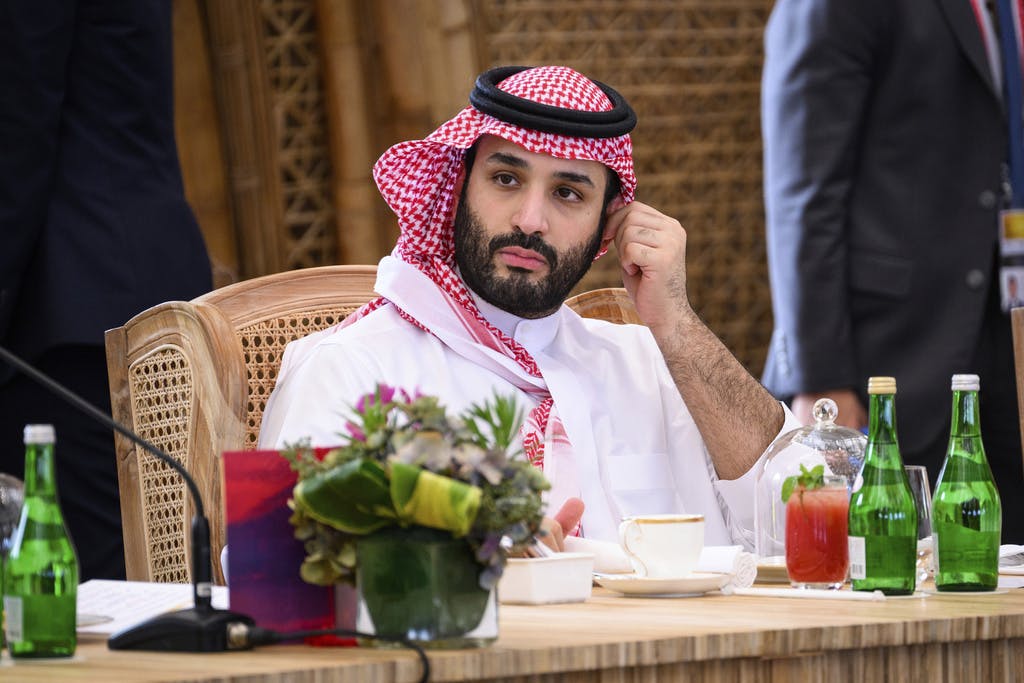Saudis Aggressively Moving Toward Some of America’s Top Enemies
After Biden earlier launched a campaign to turn America’s decades-old Arab ally into a ‘pariah,’ Washington now, perhaps hopelessly, is attempting to repair relations.

As President Biden makes feeble fence-mending attempts after clearly snubbing Riyadh earlier in his presidency, the Saudi crown prince, Mohammed bin Salman, is charting an ambitious course that includes alliances with some of America’s least favorable regional and global players.
MbS, as the crown prince is known, is warming up to countries he once shunned, including Communist China, Russia, and Syria, as well as a terrorist group, Hamas. Perhaps paradoxically, Israel at the same time maintains hopes of widening the Abraham Accords to include Riyadh.
“We want normalization and peace with Saudi Arabia,” Prime Minister Netanyahu said Monday. “We view that as perhaps a giant leap towards ending the Arab-Israeli conflict. This agreement could have monumental consequences, historic consequences both for Israel, for Saudi Arabia, for the region, and for the world.”
Mr. Netanyahu was hosting Senator Graham of South Carolina, who is in Israel following a visit to Riyadh, where he met with the crown prince. The Saudis are “ready to move on” toward peace with Israel, Mr. Graham told Israeli reporters, adding that in return Riyadh demands to sign defense and trade agreements with America.
Mr. Graham — a Republican who has said after the Jamal Khashoggi murder that America should consider MbS “toxic” — now says there is bipartisan support for improved relations with Riyadh. Yet, the window is fast closing for cutting an American-Saudi deal that would include a peace treaty with Israel, he adds; it must be completed before the presidential race begins in early 2024.
As Washington deliberates over which of the multiple Saudi demands it could accept, Riyadh is launching its most ambitious diplomacy ever, claiming a leadership position in the region and beyond.
Riyadh’s foreign minister, Faisal bin-Farhan, landed at Damascus Tuesday for a sit-down with President Assad. It was the first such visit since the 2011 eruption of the Syrian civil war, a bloodbath that made Mr. Assad persona non-grata for almost all Arab leaders. “Assad must go” became a Washington rally cry as well.
Saudi Arabia now seeks to find a political solution to the war, its foreign ministry said ahead of Prince bin-Farhan’s visit, adding that Riyadh wishes to preserve Syria’s “Arab identity, and return it to its Arab surroundings.” The visit followed last month’s groundbreaking renewal of diplomatic ties between Riyadh and Iran under Beijing’s auspices.
Another Iranian ally, the Houthis, are in negotiations with Raiyadh over ending the cruel and bloody Yemen war. Prisoner exchanges were conducted in recent days, and the Houthi leader, Mahdi Al-Mashat, said peace talks with the Saudis will resume following Friday’s Eid al-Fitr, the Ramadan-ending holiday.
The Palestinian Authority president, Mahmoud Abbas, landed at Riyadh Monday for a Tuesday meeting with MbS. At the same time a Hamas delegation led by its political chief, Ismail Haniyeh, is in the Saudi capital for the first time in seven years.
The Saudis are attempting to make peace between rival Palestinian factions, Mr. Abbas’s American-supported Fatah and Hamas, which is listed by the Department of State as a terror organization. Hamas is emerging as one of the most prominent proxies in the Iran Islamic Revolutionary Guards Corps’ shadow war against Israel.
“In recent months the Islamic Republic has been operating in two parallel axes,” two Tel Aviv University Iran watchers, Sima Shine and Raz Zimmt, wrote Tuesday. “On the one hand, Tehran signs agreements with Arab countries with which until recently it has had hostile relations. On the other it strengthens the ‘axis of resistance,’” and urges proxies to increase attacks against Israel.
Riyadh, meanwhile, is reportedly maintaining clandestine relations with Israel, including on Iran-related intelligence, at the same time that it conducts frenzied, unprecedented diplomacy with Tehran and its proxies.
Beyond the region, the Saudis are tightening relations with Moscow in an attempt to control the world’s energy markets. Riyadh’s relations with Beijing, its largest oil client, are warming up so fast that some Saudis openly talk of replacing the dollar with the yuan as the oil market’s dominant currency.
For more than two years, Washington was convulsed in frenzied attacks on MbS and the Saudis. Mr. Biden launched a campaign to turn America’s decades-old Arab ally into a “pariah.” Now, perhaps hopelessly, Washington is attempting to repair relations.
Mr. Biden’s national security adviser, Jake Sullivan, called on the crown prince last week to talk about the Yemen peace process. In early April the CIA director, William Burns, made a previously unannounced Riyadh visit. Last week he was followed by a Mideast adviser, Brett McGurk, and a global energy envoy, Amos Hochstein.
Mr. Biden may, or may not, want to remain relevant and shape events in a Mideast where MbS is increasingly a top player. If he does, the president needs to work hard, change course, and perhaps eat some crow as well. He also must do so soon, before he launches his expected presidential re-election campaign.

